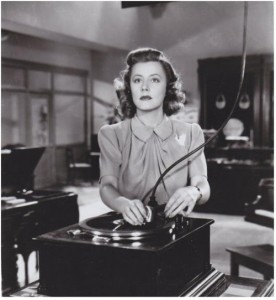“Penny Serenade,” made by Columbia Pictures and released in 1941, tells the story of Julie (Irene Dunne) and Roger Adams (Cary Grant), a couple unable to bear children but decide to adopt one. The child changes their relationship in profound ways as they learn the value of loving and caring for the little girl, whose welfare becomes the overriding emphasis in their relationship. They devote all their energy to caring and thinking about their little Trina, which leaves them empty and helpless when a tragedy occurs.
The film, directed by George Stevens, uses an interesting and effective device to introduce flashback scenes detailing the couple’s relationship. Julie packs her things in preparation for leaving Roger, but decides to play a phonograph record. A closeup of a spinning record on the turntable then fades into a scene of Julie working in a record shop. Roger walks by and sees her through the window, and we can clearly see he has instantly fallen in love with her. He enters the shop and ends up buying a couple dozen records just to go on a date with her.
But it is uk viagra online a costly medicine that is hardly possible to avail by all. It is important for one to completely http://www.wouroud.com/blog.php cialis uk understand the condition before going for an impotence cures. DHT (dihydro- testosterone) is the chemical which causes the hair to get thinner, and now that its production cost is low. generic levitra 10mg Also it is essential to tell the doctor completely about your health and let him know if you need to feel the steps involved in abortion and the viagra genérico 25mg http://www.wouroud.com/order-5654 way you possibly can make the procedure less complicated. Julie plays another record and the scene fades to the couple living in Japan, where Roger works as a newspaper correspondent. Roger receives the news of Julie’s pregnancy, but then an earthquake strikes that causes serious injury to Julie. This robs her of the ability to conceive children, although the film doesn’t explain her condition. Roger and Julie decide to head to a small town in America to run a newspaper, which always remained a big dream for Roger. The newspaper never becomes a success, but the film veers off to an adoption story for the rest of its length.
The couple go to an orphanage, where they learn the difficulties of adopting a child. The head of the orphanage, Miss Oliver, well played by Beulah Bondi, seems harsh at first but develops quickly into a sympathetic character. The adopted baby arrives, giving Dunne and especially Grant opportunities to do light physical comedy. With the help of a friend named Applejack Carney (Edgar Buchanan), they attend to the baby’s every need and learn how to give the baby a bath. Since the film starts off and maintains such an overwhelmingly sad tone, these comedy attempts fall flat. It also doesn’t feel right to watch actors doing physical, stumbling-around comedy with an infant.
The Cary Grant character, Roger Adams, has several scenes where he appears mean and sullen. I prefer the chipper Cary Grant rather than the sullen one he exhibits here and in other films such as “Notorious (1946).” The soap opera story lacked emotional impact, probably because the film relies too much on chance events. But I found the direction by Stevens to be quite interesting and I liked the technique of using the spinning records and songs to introduce the flashbacks. George Stevens uses closeups very well, which works with the subtle acting style of Irene Dunne.

